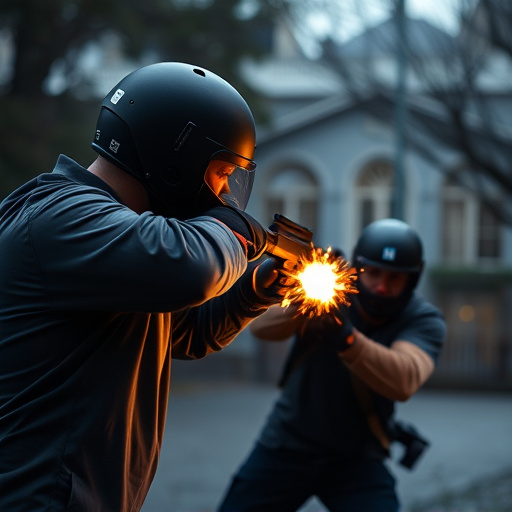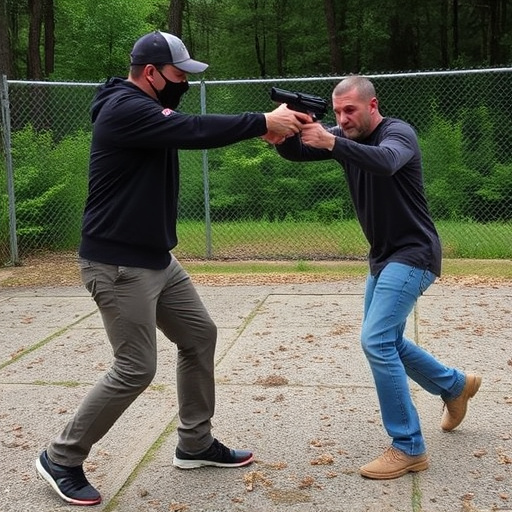Understanding and adhering to state laws regarding civilian stun gun ownership is crucial for ensuring legal compliance, safety, and effective home defense with best stun guns. Research specific regulations on age, background checks, training, voltage, weight, and storage to create a secure environment for homeowners and law enforcement. Responsible handling through thorough research, proper training, and regular maintenance minimizes accidental activation and misuse.
In today’s world, many civilians are turning to stun guns as a means of personal protection. However, understanding state laws regarding civilian taser ownership is crucial before making such a decision. This article guides you through the legal requirements for acquiring stun guns for home defense in various states. We also outline best practices for responsible ownership and highlight some of the best stun guns available for your peace of mind.
- Understanding State Laws on Civilian Taser Ownership
- Legal Requirements for Acquiring Stun Guns for Home Defense
- Best Practices for Responsible Stun Gun Ownership
Understanding State Laws on Civilian Taser Ownership

Understanding state laws on civilian taser ownership is crucial when considering the purchase of a stun gun for home defense, as regulations vary widely across the United States. Many states allow individuals to own tasers with certain restrictions, while others have stringent requirements or outright ban their possession by civilians. These laws often factor in considerations like age, background checks, training, and intended use.
When looking for the best stun guns for home defense, it’s essential to research your state’s specific regulations. This includes understanding the type of taser allowed (e.g., electric, pepper spray), any power output limitations, and registration or licensing requirements. Staying informed about these laws ensures compliance and promotes a safe environment for both homeowners and law enforcement.
Legal Requirements for Acquiring Stun Guns for Home Defense

In many states across the US, civilians can legally own stun guns for self-defense, but acquiring one involves adhering to stringent requirements set by state laws. The process typically begins with a thorough background check to ensure the buyer is of legal age and does not have any disqualifying criminal history or mental health records. Additionally, some states mandate completion of a safety course or training session focused on stun gun use and handling to prove the individual understands how to deploy and store their device responsibly.
When seeking the best stun guns for home defense, prospective owners should consider state-specific regulations regarding voltage, weight, and charge capabilities. While federal laws generally prohibit the sale of stun devices with a voltage exceeding 3,000, state laws may have varying limits. It’s crucial to research and understand these requirements to ensure compliance and select a stun gun that aligns with both local and federal guidelines, offering peace of mind and effective home defense capabilities.
Best Practices for Responsible Stun Gun Ownership

When considering civilian Taser ownership, it’s crucial to adopt best practices that ensure responsible and safe handling. Firstly, thorough research is essential to choose the best stun guns for home defense; models designed with safety features and easy-to-understand controls are ideal. Look for devices with built-in safety mechanisms, such as automatic shut-off after deployment, to minimize accidental activation or misuse.
Additionally, proper training in Taser usage is paramount. Enrolling in certified courses can equip individuals with the knowledge to deploy these devices effectively and safely. Storing stun guns securely, out of reach of unauthorized persons, including children and guests, is another vital step. Regular maintenance and inspections ensure the device remains functional and reliable when needed most.
When considering civilian taser ownership, understanding state laws is paramount. Each jurisdiction has its own set of legal requirements for acquiring and owning stun guns, focusing on ensuring public safety while respecting individual rights to self-defense. For those seeking the best stun guns for home defense, adhering to these guidelines and best practices can help foster a secure environment without compromising responsible ownership. By staying informed about state laws and following recommended procedures, civilians can legally and responsibly protect themselves and their loved ones.
